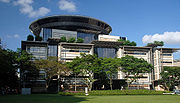| This is a sandbox for an article that is being edited as part of an educational assignment called the SMU Constitutional and Administrative Law Wikipedia project. If you are not a member of the project, please do not edit this article. To contact the project co-ordinator please leave a message at "User talk:Smuconlaw". |
| Sgconlaw/Tan Eng Hong v. Attorney-General | |
|---|---|
 The Old Supreme Court Building, photographed in April 2007 | |
| Court | Court of Appeal of Singapore |
| Full case name | Tan Eng Hong v. Attorney-General |
| Decided | 21 August 2012 |
| Citation | [2012] 4 S.L.R. 476 |
| Case history | |
| Prior action | Tan Eng Hong v. AG [2011] 3 S.L.R. 320, H.C. |
| Related action | Tan Eng Hong v. AG [2011] 3 S.L.R. 320, H.C. |
| Court membership | |
| Judges sitting | Andrew Phang Boon Leong JA, V K Rajah JA and Judith Prakash J |
| Case opinions | |
| The test for standing in constitutional law challenges is that of the Karaha Bodas test. | |
Tan Eng Hong v. Attorney-General [1] was a constitutional law case where the Singapore Court of Appeal overturned a decision made by the Singapore High Court against Tan Eng Hong ("Tan"). The High Court had found that whilst Tan had locus standi to bring an application challenging the constitutionality of Section 377A of the Penal Code, the application disclosed no real controversy to be adjudicated.[2] Thus, the Assistant Registrar’s original decision[3] to strike out Tan’s application was upheld.
Tan subsequently appealed against the High Court’s decision, attempting to establish that he had an arguable case as this would be sufficient to prevent the striking out of his application.[4]
The Court of Appeal considered in detail whether the test for locus standi in applications involving constitutional rights was different from, or less strict[5] than the test laid down in Karaha Bodas Co. LLC v. Pertamina Energy Trading Ltd. [6] (“Karaha Bodas”). It was held that the case of Eng Foong Ho v. Attorney-General[7] (“Eng Foong Ho”) did not provide support for a lower threshold of locus standi.[8] Utilizing the case of Chan Hiang Leng Colin v. Minister for Information and the Arts[9] (“Colin Chan”) as support,[10] the court affirmed the applicability of the Karaha Bodas test, holding that an applicant must demonstrate a violation of constitutional rights to be granted locus standi.[11] Additionally, it was decided that the “real controversy” requirement went to the court’s discretion, conferring discretion upon the court to hear a case in the absence of a real controversy. The Court of Appeal further held that a subsisting prosecution was not necessary to establish a violation of constitutional rights,[12] and endorsed the High Court’s view that a real and credible threat of future prosecution would suffice.[13] Also, the mere existence of an allegedly unconstitutional statute may also suffice to demonstrate a violation of constitutional rights.[14]
Two other legal issues were also considered; namely, whether the applicable test for locus standi was satisfied on the facts, and whether the facts raised any real controversy to be adjudicated. The Court of Appeal answered both questions in the affirmative, and eventually decided in favor of Tan.
- ^ Tan Eng Hong [2012] 4 SLR 496.
- ^ Tan Eng Hong, para 12.
- ^ Tan Eng Hong, para 8.
- ^ Tan Eng Hong, para 21.
- ^ Tan Eng Hong, para 74.
- ^ Karaha Bodas Co. LLC v. Pertamina Energy Trading Ltd. [2006] 1 SLR(R) 112.
- ^ Eng Foong Ho v. AG [2009] 2 SLR(R) 542.
- ^ Tan Eng Hong, para 77.
- ^ Chan Hiang Leng Colin v Minister for Information and the Arts [1996] 1 SLR(R) 294.
- ^ Tan Eng Hong, para 79.
- ^ Tan Eng Hong, para 82.
- ^ Tan Eng Hong, para 89.
- ^ Tan Eng Hong, para 112.
- ^ Tan Eng Hong, para 94.